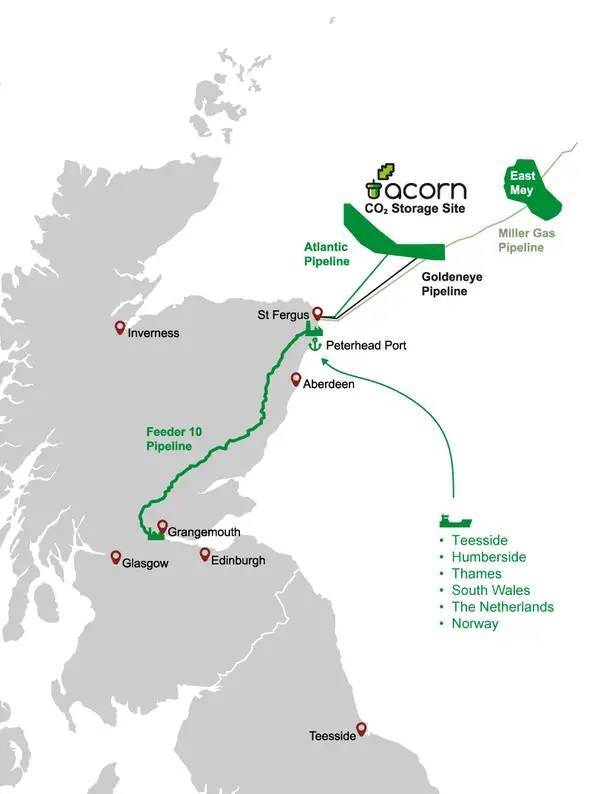
UK-based oil and gas company Harbour Energy, operator of the Humber-based Viking CO2 transportation and storage network and partner in the Acorn CCS project in northeast Scotland, welcomed the news on Monday that both projects have been awarded Track 2 status as part of the UK Government's CCS cluster sequencing process.
Acorn CCS is a CO2 transportation and storage (T&S) system which reuses legacy oil and gas infrastructure to transport captured industrial CO2 emissions from the Scottish Cluster, to permanent storage 2.5km (1.5 miles) under the North Sea.
"Today's announcement marks an important milestone for the two projects, allowing them to move into front end engineering and design (FEED) and discussions with the government over the terms of the economic licenses ahead of final investment decisions," Harbour Energy said.
According to Harbour Energy, Viking has the potential to transport and store up to 10 million tonnes of CO2 annually by 2030 and 15 million tonnes of CO2 annually by 2035 with independently verified storage capacity of 300 million tonnes of CO2 across the depleted Viking gas fields.
"The project could be transformational for the Humber region, potentially unlocking up to £7 billion of investment across the full CO2 capture, transport and storage value chain between 2025 and 2035, creating over 10,000 jobs during construction and providing an estimated £4 billion of gross value add (GVA) to the Humber and its surrounding areas," Harbour Energy said.
The Viking CCS project can also enable, through our work with Associated British Ports at the Port of Immingham, the potential for shipped CO2 from dispersed emitters elsewhere in the UK and internationally to be transported for permanent storage within the Viking fields, creating a new industry for the UK.
Linda Z Cook, CEO of Harbour Energy, commented: "Today's announcement is an important step forward for Harbour's Viking and Acorn CCS projects and the development of the carbon capture and storage industry in the UK. It is also a further demonstration of the key role that the oil and gas sector is playing by using our existing infrastructure, skills and experience to build this new industry and help deliver the energy transition.
"Viking has the potential to be transformational for the Humber, the UK's most carbon intensive industrial region, creating thousands of jobs in the area and playing a vital role in supporting the UK to meet its target to capture 30 million tonnes of CO2 annually by 2030."
Responding to today’s announcement that the Scottish Cluster/Acorn Project and Viking have been chosen as the next CCS clusters to be developed in the UK, SSE’s chief executive Alistair Phillips-Davies said:
“Carbon capture will play a critical role not only in decarbonising the UK’s power system but also in unlocking economic growth and boosting our energy security, and today’s announcement marks a major step forward in its deployment. We know how important it is that the north-east of Scotland and Humber are decarbonised and the decision to support the Scottish Cluster and Viking shows that there is commitment to doing so.
“Time remains of the essence. Now, we must move quickly to deploy the transport and storage infrastructure which will underpin the rollout of CCS across the chosen clusters. Doing so will allow crucial low-carbon projects – such as our carbon capture project at Peterhead - to be brought forward, supporting the energy transition while providing good, green jobs and enhancing regional economies. The UK has a real opportunity to lead the world on carbon capture if we can accelerate progress and today's announcement provides welcome impetus."
To remind, back in October 2021, the UK Government selected two industrial clusters as Track-1 clusters for the development of carbon capture utilization and storage projects, putting them on course for launch by the mid-2020s with financial support from the government.
The two CCUS clusters labeled Track-1 were the Hynet Cluster in north-west England and the East Coast Cluster in Teesside and the Humber. The Scottish Cluster, which included the Acorn CCS project, had been announced as a “reserve cluster” for ‘Track 1’.
In March 2023, the UK Government stated that it believed the Acorn and Viking transport and storage (T&S) systems were best placed to deliver Track-2 objectives.
Track-2 aims to establish two CCUS clusters, contributing to the country's ambition to capture and store 20-30 megatonnes per annum (Mtpa) of CO2 across the economy by 2030.
Dr Nick Cooper, CEO of Acorn lead developer Storegga, said Monday: "We are thrilled that the Acorn Project has advanced directly into Track-2. Acorn has been progressed by the development partners as the Track-1 reserve since late 2021, and is ready to move promptly to support the decarbonisation of Scotland and the wider UK.
“Today’s news is a defining milestone for us, and the Scottish Cluster. Acorn will be a major contributor towards meeting the UK and Scotland’s carbon reduction targets, able to serve emitters connected by pipeline and ship.
“As Lead Developer, Storegga thanks Acorn partners and Scottish Cluster participants for their support and we look forward to working with Government to deliver the multiple benefits of creating and future-proofing jobs, bringing inward economic investment, developing green-tech industries and, crucially helping decarbonise Scotland and the UK.”
Acorn is a joint venture between Storegga, Shell UK, Harbour Energy, and North Sea Midstream Partners.